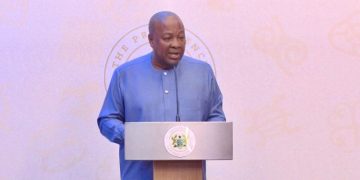Danish EU Presidency Pushes for Expanded ‘Voluntary Return’ Programmes in Africa
A Danish presidency paper, released today by the NGO Statewatch, described “voluntary return and reintegration programmes” in Africa as a “critical part” of Europe’s future deportation strategy.
The paper comes as deportations move to the forefront of the Brussels agenda, with a new Regulation under discussion and ongoing meetings among key Member States. Critics note that Europe’s deportation system remains largely ineffective, with fewer than 20% of people issued deportation orders ultimately deported.
The Danish Presidency calls for “stronger capacity” for readmission and reintegration programmes in origin, transit and host countries – particularly in North Africa and the Sahel – but notes that a persistent “resource gap” in EU funding remains a “major challenge”.
According to the paper, in 2024 Libya, Niger, Algeria and Tunisia were the top four countries of departure for “IOM assisted returns”. More than 40,000 people were “voluntarily returned” from these countries last year, primarily to other African states. Tunisian human rights activist, Jihed Brirmi, said: “IOM´s so-called “voluntary return” from Tunisia is not a real choice, it´s the last exit from a system that has already stripped people of dignity. Externalisation pushes Europe’s borders onto Sfax olive fields, recycling colonial logics where the South polices mobility for the North. Calling this humanitarian is just another way to hide violence.”
An annex provides an overview of active programmes: IOM is implementing returns in Côte d’Ivoire, Ghana, Nigeria and Cameroon, with the help of the German development agency GIZ in Cameroon, and the French development cooperation agency Expertise France and the Belgian agency Enabel in Côte D’Ivoire. In Guinea, the programme is run by Enabel and Expertise France.
Dr. Ngozi Louis Uzomah, researcher at the University of Nigeria, said: ““Return migration is complex. Pushing for efficiency – large numbers of returns – without effectiveness – sustainable reintegration and respect for rights – risks failure. Policies must be shaped from the bottom up with returnees, local communities and traditional leaders, or people will be forced into remigration when their needs go unmet.”
A new initiative – “Managing Migration Better in West Africa” – is in development. It will target Chad, Côte D’Ivoire, Ghana, Guinea, Nigeria, Senegal, Sierra Leone and The Gambia, with both “reintegration and counter-migration aims”.
The Danish presidency paper notes that, “while increasing return rates is a key political concern, meaningful reintegration support could contribute to limiting the risk of irregular remigration”.
Chris Jones, Director of Statewatch, said, “the growing interest in “reintegration” programmes shows the extent of European governments’ fixation with controlling human mobility. ‘Get out, stay out and stay put’ is the goal. In some ways the programmes look like the individualisation of development aid. Given that development programmes do not prevent people from migrating, should we expect “reintegration” projects to work any differently?”








